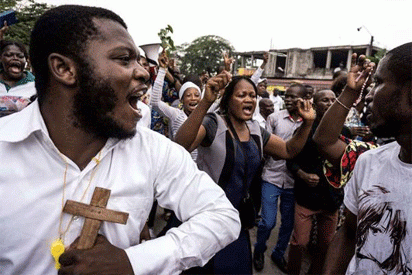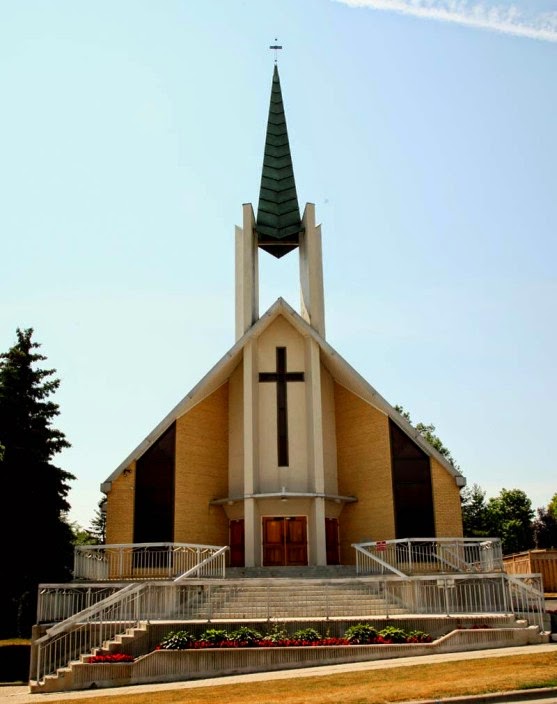“It used to be robbers who mugged pedestrians. Now it’s a gang of priests assaulting worshippers” (Hosea 6:9).

A colleague of mine insists he is still looking for a Pastor with a Centre in London. He said: “Anybody who knows where I can find him should let me know.” “Why are you looking for him?” I wondered. “He owes me money,” he maintained.
Money Doublers
He had attended one of the services conducted by the pastor as guest-preacher in his church. The Pastor preached a sermon entitled: “24-Hour Miracle.” At the climax, he asked the congregation to write cheques for as much money as they possibly could, with the iron-clad guarantee that it would more than double within 24 hours. In that time, he assured them, someone would send them a ridiculously large sum by divine ordinance. You might get a call or a visit from someone about the miracle money, or notification that it had been deposited in your bank account.
This gentleman was so hoodwinked by this hocus-pocus that he first wrote a cheque for half of his entire savings. Then, on second-thoughts, he gave the other half as well. The next day, he did not go to work, waiting for the miracle call; but nothing happened. He thought perhaps he had made a mistake. Perhaps the 24 hours would start counting later than he had expected; so he waited for another day. Still nothing happened. After two weeks, it dawned on him that he had been scammed. By that time, the cheques had long been cashed. He went looking for the “man of God,” but he had left the country.
Let me let you in on a secret. Pastors don’t usually do a scam of this scale in their own churches. They do it at the invitation of another pastor. But they have an agreement beforehand that for every naira raised, the host pastor would give them a certain percentage as commission. This is then done on a tit-for-tat basis. When they do the scam in your church, you reciprocate by doing it in theirs.
Sometimes it gets really wild and this scam is done over several days. People are told to go and bring their televisions, stereos, fridge-freezers, cars, jewellery, money; anything and everything. Some even bring the Certificate of Occupancy of their homes. Some give the very suits they are wearing and go back home in their underwear, confident that God is going to astonish them. It usually takes a while before they realise they have been conned. But some never wake up from the hypnosis.
Daylight robbery
Jide Ayanfalu inherited a generator from his late “guardian.” He used it for business purposes by renting it out to people who needed it on special occasions. It so happened that the generator in his church, Zoe Ministries Worldwide, was stolen. The pastor insisted that church-members should not be told about the theft; otherwise they might conclude that God was not in the church. He asked Jide if they could use his generator in the meantime.
Jide was agreeable to this: some of his best customers were churches. But one week, two weeks, three weeks, one month, after the church took his generator; Jide was not paid a dime. Two months, three months, four months afterwards; still no payment for the use of the generator. Finally, Jide summoned up courage to confront the pastor. If they would not pay him for the use of his generator, at least they should give it back to him.
The pastor was very offended. He preached a fiery sermon in which he told the people in no uncertain terms that their destinies were tied to his church. “Don’t you know,” he asked menacingly, “we have the power to withhold your blessings?” The royal “we” referred to the pastor himself. Then he button-holed Jide after the service and went for the jugular: “Don’t you think you should give the church your generator?” he demanded.
Jide was troubled and could not answer. He came to me to seek counsel as to what he should do. I immediately pointed out to him that a robbery was in progress. I said to him: “Jide, forget about having any discussion with your pastor. Hire a van and go and remove your generator from the church.”
Gangs of priests
In biblical days, Shechem was a “city of refuge” as well as a city of Levites and priests. The cities of refuge were established to provide hiding-places for the guiltless refugee on the run for his life from a stubborn-pursuer. But the priests banded together as a gang of robbers, and they waylaid the hapless on the way to Shechem.
In effect, those appointed to teach the people the truth of God that they might live were the very ones who endangered their lives. Thus, Hosea observes that: “It used to be robbers who mugged pedestrians. Now it’s a gang of priests assaulting worshippers.” (Hosea 6:9).
Today, pastors are no longer preoccupied with the rehabilitation of thieves. They are now single-minded in swindling members of their congregation.
Offerings by extortion
My wife and I had gone one Sunday to worship at our local parish of the Redeemed Christian Church of God, Lagos. But what ensued that morning caught us off-guard. The pastor was in a nasty mood. The new church building was not progressing at a desirable pace. Apparently, the funds for it had dried up. So the entire service was devoted to reprimanding church-members for not contributing enough money to the Building Fund.
Suddenly, he ordered the entire congregation to stand up. Then he asked those prepared to contribute a very high amount of money to raise their hands. When they did, he instructed the ushers to write down their names. He then told them to sit down. Then he mentioned another sum a little lower than the previous one, and went through the same process again and again. By so doing, he was determined to extract a commitment from everyone present by hook or crook.
We were not opposed to contributing to the Building Fund, but were determined not to be arm-twisted. We were also opposed to the making of public pledges. Jesus says: “When you do a charitable deed, do not let your left hand know what your right hand is doing, that your charitable deed may be in secret; and your Father who sees in secret will himself reward you openly.” (Matthew 6:3-4).
So we resolved not to oblige to the pastor’s demands. He kept going one sum lower than the next and soon, he was down to one hundred naira in the attempt to shame those of us still on our feet. But we kept on standing and refused to make any public commitment. Then he did something strange. He asked an usher to give me a cordless microphone and then he asked: “Dr. Aribisala, maybe you can tell us how we are supposed to pay for the new building.”
The eyes of the entire church were upon me. I noticed that many were even embarrassed for my sake. But I refused to be intimidated. So I answered him: “Pastor, I am not qualified to answer that question. I think we should fast and pray and ask the Lord.”
Femi Aribisala



















